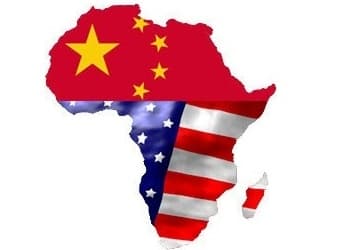U.S. Secretary of State Hillary Clinton is in the midst of an 11-day trip across sub-Saharan Africa. Speaking on 1 August on the topic “Remarks on Building Sustainable Partnerships in Africa,” Clinton at the University of Cheikh Anta Diop in Dakar, Senegal, Clinton told her audience, “The Obama Administration’s comprehensive strategy on Sub-Saharan Africa is based on four pillars: first, to promote opportunity and development; second, to spur economic growth, trade, and investment; third, to advance peace and security; and fourth, to strengthen democratic institutions.”
Warming to her themes, Clinton continued, “We’re also working with resource-rich nations to help make sure that their mineral and energy wealth actually improves the lives of their citizens. The days of having outsiders come and extract the wealth of Africa for themselves leaving nothing or very little behind should be over in the 21st century.”
While Clinton did not specify the “outsiders,” in Beijing it was taken as a direct criticism of Chinese African policies and the country was quick to reply. Xinhua news agency stated that Clinton's Africa trip was a "plot to sow discord between China (and) Africa" and continued, Whether Clinton was ignorant of the facts on the ground or chose to disregard them, her implication that China has been extracting Africa's wealth for itself is utterly wide of the truth."
Leaving no rhetorical stone unturned, China, which suffered colonial depredations at the hands of European powers in the 19th century, saw the editorial continue, "Ironically, it was the Western colonial powers that were exactly the so-called outsiders, which, in Clinton's words, came and extracted the wealth of Africa for themselves, leaving nothing or very little behind."
What is the overall picture then?
In 2011 Africa-China bilateral trade reached $166 billion in 2011, an increase of 300 percent over 2006 figures and China's direct investments in Africa are now nearly $15 billion.
The Government of China is estimated to maintain over 150 commercial attachés and associated staff at its embassies in 48 African countries, while “according to a recent report produced by the Brooking Institution’s Africa Growth Initiative, there are currently just five U.S. Commerce Department Foreign Commercial Service Officers in Africa and one is set to leave from the embassy in Ghana this summer.” Furthermore, Chinese President Hu Jintao has made seven trips to Africa, five as head of state and has visited 17 countries.
U.S. exports to sub-Saharan Africa during 2011 were $21.1 billion, up 23 percent compared to 2010 and U.S. imports from sub-Saharan Africa during 2011 were $74.2 billion, up 14 percent compared to 2010 for a total of $95.3 billion, according to the Office of the United States Trade Representative (USTR). The figure represents just 57 percent of China’s bilateral trade figures.
But Washington is obviously looking to improve its “bottom line” – as the USTR's Office of African Affairs notes, “Sub-Saharan Africa presents many opportunities for U.S. businesses as an emerging market for American exports. Between 2000 and 2010, six of the ten fastest-growing economies in the world were in sub-Saharan Africa.”
But what about energy?
In 2011, about 62 percent of African exports to China consisted of crude oil, with over $24.7 billion coming from Angola, now the source of over 9 percent of China’s oil imports. And the U.S.? Over the past decade, petroleum products accounted for roughly 89 percent of U.S. imports from Africa, with no less than 40 percent of Nigeria’s oil exports head westwards to the U.S., with Nigeria now the fifth largest source of oil imports to the U.S. and Angola the eighth. Companies operating in Nigeria include the U.S. companies Exxon-Mobil, Chevron and ConocoPhillips and… the Chinese National Offshore Oil Corporation. International oil companies operating in Angola include U.S. companies Chevron, ExxonMobil and Occidental Petroleum and… Sinopec.
And U.S. interest in African petroleum is only going to increase. The U.S. National Intelligence Council forecasts that U.S. oil imports from Africa will rise to 25 percent within three years, primarily from Gulf of Guinea countries, Nigeria and Angola.
So, in the shadow war between Beijing and Washington for influence on the “Dark Continent,” the latter should take note of the results of Beijing hosting the Fifth Forum on China-Africa Cooperation on 19-20 July, where it promised a) $20 billion in assistance to the continent, double the amount pledged three years ago in Sharm el Sheikh, Egypt, in 2009; b) an “African Talents Program” to train 30,000 people in various sectors and set up vocational training centers, 18,000 government scholarships and the dispatch of 1,500 Chinese medical personnel to Africa; c) to build infrastructure partnerships; d) people-to-people exchanges and finally, security pledges, led by the Initiative on China-Africa Cooperative Partnership for Peace and Security.
Seems a bit more than Hillary’s hectoring lectures on human rights. Of course, any African nation that wants to host the Pentagon’s AFRICOM headquarters will also be most welcome in Washington.
For the moment though, African leaders are more likely to be interested in $20 billion aid, training for 30,000 people 18,000 government scholarships and 1,500 medical personnel, whatever the source.
And, eyes on the prize, such largesse will probably pay off in energy concessions.
By. John C.K. Daly of Oilprice.com


















